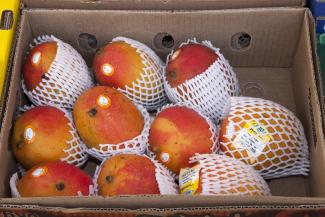Tropical fruit
Untapped potential

Fresh as well as processed fruit has a positive image. Germany imports varieties that cannot be cultivated in Germany, but also some that are grown domestically. A label must indicate the country of origin of fresh fruit. The rules for processed fruit are different, however. In this case, what matters is where the final work was done. Apple juice is considered German if concentrate from China is diluted for the end-consumer in Germany. According to the same EU rules, jam made from Filipino fruit in the Netherlands is European too. The German Commission Justitia et Pax demands more transparency. In the eyes of this Catholic agency, EU policies on agriculture and international development are not coherent. One consequence, according to Justitia et Pax, is that European institutions are not concerned about sustainability when dealing with imported goods and do not take into account environmental or social production standards. The lack of such standards, however, results in exploitation, hunger and poverty, the activists warn.
Justitia et Pax recently published a booklet to stimulate debate on the trade in tropical fruits. Such debate is warranted, the Commission states, in order to define reasonable rules. The document points out that broad participation in such debate is desired, and that the involvement of exporting countries matters most. (yw)
Link:
“Süße Früchte – gut für alle?” (Sweet fruit – good for everyone? Only in German):
http://www.justitia-et-pax.de > Publikationen > Entwicklungspolitik > Publikationen im Sachbereich Entwicklungspolitik > “Süße Früchte – gut für alle?” (Heft 126)






